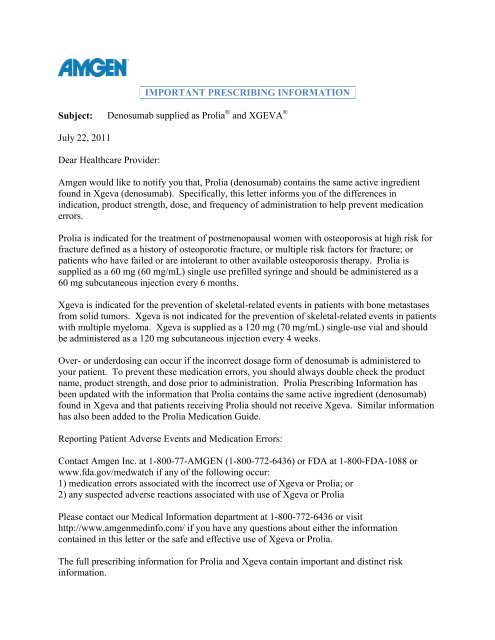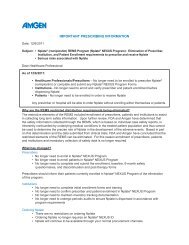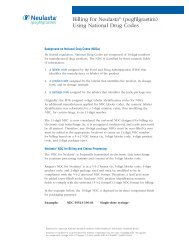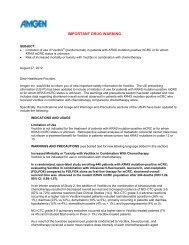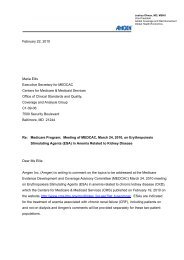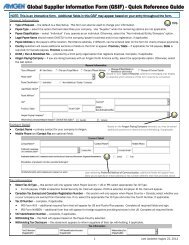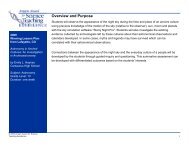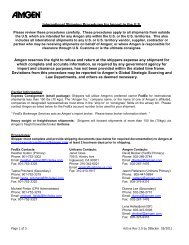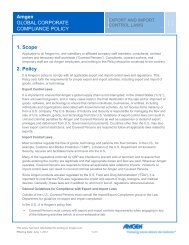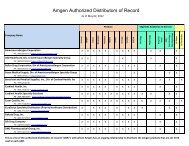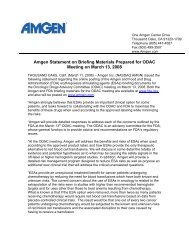Healthcare Provider Introductory Letter Redline - Amgen
Healthcare Provider Introductory Letter Redline - Amgen
Healthcare Provider Introductory Letter Redline - Amgen
Create successful ePaper yourself
Turn your PDF publications into a flip-book with our unique Google optimized e-Paper software.
IMPORTANT PRESCRIBING INFORMATION<br />
Subject: Denosumab supplied as Prolia ® and XGEVA ®<br />
July 22, 2011<br />
Dear <strong>Healthcare</strong> <strong>Provider</strong>:<br />
<strong>Amgen</strong> would like to notify you that, Prolia (denosumab) contains the same active ingredient<br />
found in Xgeva (denosumab). Specifically, this letter informs you of the differences in<br />
indication, product strength, dose, and frequency of administration to help prevent medication<br />
errors.<br />
Prolia is indicated for the treatment of postmenopausal women with osteoporosis at high risk for<br />
fracture defined as a history of osteoporotic fracture, or multiple risk factors for fracture; or<br />
patients who have failed or are intolerant to other available osteoporosis therapy. Prolia is<br />
supplied as a 60 mg (60 mg/mL) single use prefilled syringe and should be administered as a<br />
60 mg subcutaneous injection every 6 months.<br />
Xgeva is indicated for the prevention of skeletal-related events in patients with bone metastases<br />
from solid tumors. Xgeva is not indicated for the prevention of skeletal-related events in patients<br />
with multiple myeloma. Xgeva is supplied as a 120 mg (70 mg/mL) single-use vial and should<br />
be administered as a 120 mg subcutaneous injection every 4 weeks.<br />
Over- or underdosing can occur if the incorrect dosage form of denosumab is administered to<br />
your patient. To prevent these medication errors, you should always double check the product<br />
name, product strength, and dose prior to administration. Prolia Prescribing Information has<br />
been updated with the information that Prolia contains the same active ingredient (denosumab)<br />
found in Xgeva and that patients receiving Prolia should not receive Xgeva. Similar information<br />
has also been added to the Prolia Medication Guide.<br />
Reporting Patient Adverse Events and Medication Errors:<br />
Contact <strong>Amgen</strong> Inc. at 1-800-77-AMGEN (1-800-772-6436) or FDA at 1-800-FDA-1088 or<br />
www.fda.gov/medwatch if any of the following occur:<br />
1) medication errors associated with the incorrect use of Xgeva or Prolia; or<br />
2) any suspected adverse reactions associated with use of Xgeva or Prolia<br />
Please contact our Medical Information department at 1-800-772-6436 or visit<br />
http://www.amgenmedinfo.com/ if you have any questions about either the information<br />
contained in this letter or the safe and effective use of Xgeva or Prolia.<br />
The full prescribing information for Prolia and Xgeva contain important and distinct risk<br />
information.
Prolia is contraindicated in patients with hypocalcemia and hypocalcemia must be corrected<br />
before initiating Prolia. Serious infections including skin infections leading to hospitalization<br />
may occur. Dermatitis, rashes, eczema, and osteonecrosis of the jaw (ONJ) have been reported.<br />
Xgeva can cause severe hypocalcemia. ONJ can occur in patients receiving Xgeva.<br />
Please refer to the accompanying FDA-approved labeling for a complete discussion of the risks<br />
associated with Prolia and Xgeva, as the presentation of risk information in this letter is not<br />
comprehensive. The updated Prolia Prescribing Information and Medication Guide are enclosed,<br />
along with the Xgeva Prescribing Information.<br />
Sincerely,<br />
Sean E. Harper, MD<br />
Senior Vice President, Global Development and Chief Medical Officer<br />
<strong>Amgen</strong> Inc.


